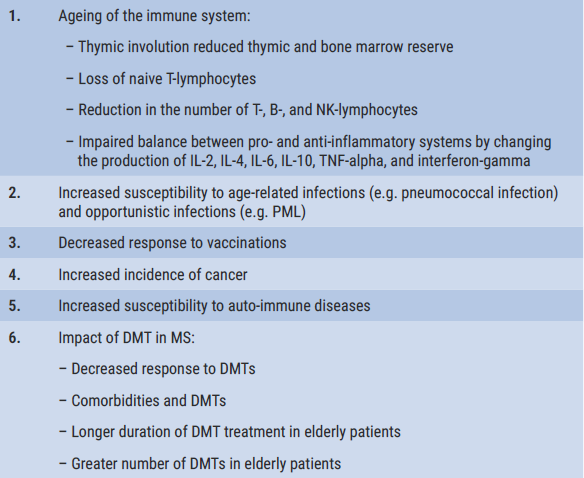https://doi.org/10.55788/4866d479
Definition
Prof. Monika Adamczyk-Sowa (Medical University of Silesia, Poland) talked about the relevance of immunosenescence to MS immunopathogenesis and treatment [1]. She gave the following definition of immunosenescence: “Disease-independent, age-associated, quantitative, and functional changes of the innate and adaptive immune compartments, resulting in a low-grade pro-inflammatory state, referred to as inflamm-aging. This might play an important role in the efficacy as well as the risks of DMTs, but also in the course of MS, for example in the transition to progressive MS.” Cellular senescence is distinct from cellular quiescence in that senescent cell activity usually exerts a pro-inflammatory effect on surrounding cells that can impair or alter tissue function, termed the senescence-associated secretory phenotype (SASP), Prof. Adamczyk-Sowa explained. This low-grade inflammation leads to increased susceptibility to infection, reduced vaccination efficacy, and development of autoimmunity, but also to increased oxidative stress, mitochondrial dysfunction, shortening of telomeres, and (more so in progressive forms of MS than in RRMS) increased DNA methylation and hydroxymethylation.
Relevance in MS
“MS patients have some features of immunosenescence that are observed in healthy elderly (see Table).” In other words: there is a premature onset in MS. It is unknown if this reflects the inflammatory processes associated with MS, or if the immunosenescence itself is involved in MS pathogenesis and helps to cause this inflammation.
Table: Distinctive features of immunosenescence in MS patients [1]

An open question is why MS progression continues and increases over time, while annualised relapse rate (ARR) and MRI lesion activity diminish. Prof. Adamczyk-Sowa suggested that (accelerated) shortening of telomeres with age may play an important role here. “In MS patients, shorter leukocyte telomere length is associated with a higher degree of disability, smaller brain volume, increased relapse rate, and faster conversion to progressive MS.” Therefore, telomere length may serve as a biomarker of patients' immunosenescence status and could have value to:
- Assess biological age and immune competence
- Stratify patients by molecular disease burden
- Predict disease progression and clinical outcomes
The reason Prof. Adamczyk-Sowa stressed this is because (accelerated) telomere shortening is a modifiable feature, influenced by factors such as stress, smoking, alcohol abuse, obesity, viral infections, and chronic inflammation.
Age as a risk factor
With an ageing population overall, the prevalence of elderly MS patients increases worldwide. Ageing people with MS pose a unique challenge. They are characterised by an increased susceptibility to infections, a poor response to vaccinations, and a higher risk of developing cancer, vascular diseases and neurodegeneration. There is a paucity of data on the efficacy and safety of DMTs in elderly patients and on the issue of whether or not to continue DMT treatment. Discontinuing this treatment or switching to a “safer” DMT should be discussed with the patient.
“In MS, ageing may be responsible for chronic, persistent inflammation that does not respond to immunomodulation, for loss or change of glial and neuronal function, failure of remyelination, impaired blood-brain barrier integrity, and neurodegeneration.” Therefore, potential strategies for rejuvenating the immune system have been proposed.
Prof. Adamczyk-Sowa stressed that ageing of the immune system is not only caused by natural mechanisms of senescence, but that factors like chronic disorders, lifestyle, environmental and epigenetic factors, and infections also play an important role. She advocated a holistic approach to MS treatment, including lifestyle modifications (smoking cessation, regular exercise, dietary intervention, cognitive training, and stress management) in order to reduce the impact of immunosenescence, manage comorbidities, and maintain quality-of-life.
- Adamczyk-Sowa M. EAN/ISNI: Immunosenescence and multiple sclerosis – relevance to immunopathogenesis and treatment. 1. EAN 2023 Annual Meeting, 1–4 July, Budapest, Hungary.
Copyright ©2023 Medicom Medical Publishers
Posted on
Previous Article
« GLP-1 agonists induce weight loss and alleviate headache in idiopathic intracranial hypertension Next Article
Withdrawing DMF in early pregnancy does not increase relapse risk in pregnant patients with MS »
« GLP-1 agonists induce weight loss and alleviate headache in idiopathic intracranial hypertension Next Article
Withdrawing DMF in early pregnancy does not increase relapse risk in pregnant patients with MS »
Table of Contents: EAN 2023
Featured articles
Letter from the Editor
Alzheimer’s disease and dementia: the road towards proactive and preventive care
Overarching Theme: Big Data
Contribution of genomics and genetics to personalised medicine
How big data can boost care for neurodegenerative disorders
COVID-19
Amantadine in early COVID-19 enhances recovery
SARS-CoV-2 vaccination in CIDP and MMN: more benefit than harm
Cerebrovascular Disease and Stroke
Intensive BP reduction associated with smaller haematoma
Cognition and Dementia
Towards cell biology of Alzheimer’s disease
Epilepsy
Minimising co-medication optimises cenobamate efficacy in drug-resistant epilepsy
Headache and Pain
GLP-1 agonists induce weight loss and alleviate headache in idiopathic intracranial hypertension
Cannabis-based medicine does not beat placebo in central neuropathic pain
80% of patients reverse from chronic to episodic migraine on anti-CGRP antibodies
Multiple Sclerosis
Which patients can initially be treated with platform DMT?
Retinal layer thickness predicts disability accumulation in early RMS
Withdrawing DMF in early pregnancy does not increase relapse risk in pregnant patients with MS
Immunosenescence and MS: relevance to immunopathogenesis and treatment
Sleep Disorders
Nightmares during childhood linked to cognitive decline later in life
Sleep changes contribute to the pathogenesis of neurodegenerative diseases
Miscellaneous
EAN guidelines on the management of ALS
What neurologists should know about bladder and sexual problems
Laughing gas abuse often leads to polyneuropathy, myelopathy, and encephalopathy
Related Articles
September 7, 2023
EAN guidelines on the management of ALS
September 7, 2023
What neurologists should know about bladder and sexual problems
© 2024 Medicom Medical Publishers. All rights reserved. Terms and Conditions | Privacy Policy

